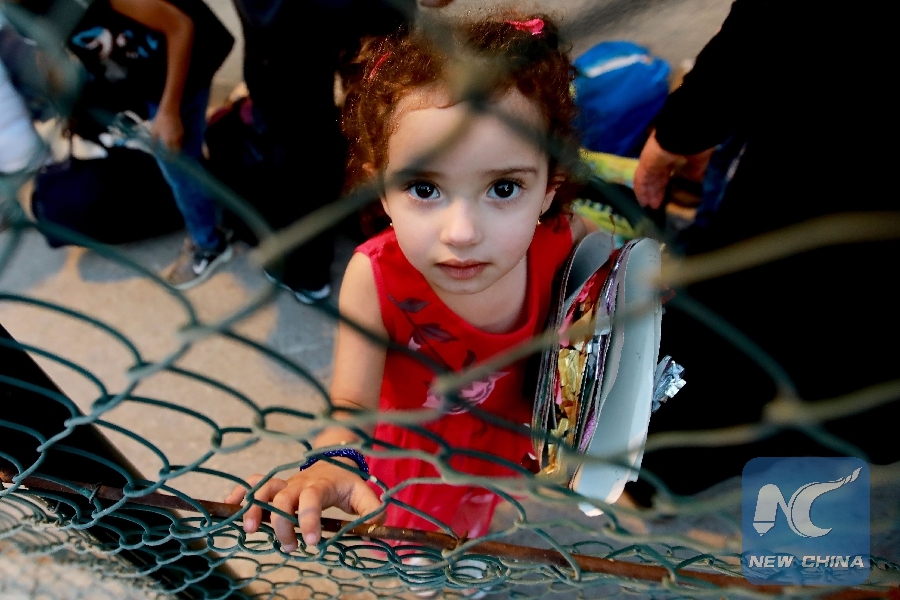
A Syrian refugee child waits as refugees prepare to leave the Lebanese capital Beirut to return to their homes in Syria on September 9, 2018. (AFP photo)
BEIRUT, Oct. 5 (Xinhua) -- Nadia El Ali, a Syrian refugee girl, met her charming prince Chadi El Mohamad of Lebanon by coincidence and ended up marrying him over two years ago.
For El Ali, who first met Mohamad and fell in love during a shopping trip, this was not a normal marriage, but one that has completely changed her fate as a former refugee fleeing war in her hometown in Syria.
"I never imagined I would be lucky enough to meet a man who would protect me against all the evils going on in this world," El Ali told Xinhua. After marriage, she moved from a shabby refugee tent to a warm house in el Bireh in West Bekaa, Lebanon.
El Ali is mong a rising number of female Syrian refugees who have married Lebanese men to seek a better life. Statistics showed the number of marriages between female Syrian refugees and Lebanese men stands at 25,000 to 28,000 since the beginning of the Syrian refugee exodus to Lebanon in 2011.
Most of these marriages happened in the refugees camps in the rural areas in southern and northern Lebanon.
Amir, a staff member at the Directorate of Personal Status in South Lebanon, said that his department, which covers about 27 towns, registers around five such marriages per month.
Suad Abu al-Ezzi, a Syrian refugee from Aleppo who got married with a Lebanese man six months ago, told Xinhua that over 20 Syrian women in the refugee camps near Chtaura have married to Lebanese men.
She described these marriages as successful, because female Syrian refugees desire for a stable and happy life after the sufferings of war and violence, while Lebanese men can reduce their marriage expenses by marrying a Syrian refugee.
Salma Abou Ajram, who came from Syria's Idlib and has a daughter marrying a Lebanese, said she strongly encourages such marriages as they benefit both sides.
Jihan al-Aziri, an 18-year-old refugee girl from Aleppo who married a Lebanese man, could not help crying when talking about her marriage.
"These are the tears of joy for fulfilling my dream, but they are also the tears of a broken heart over my wounded country," she told Xinhua.
However, marriage procedures between Syrians and Lebanese have become complicated due to the difficulties of obtaining necessary official documents for the Syrians because of the ongoing civil war back home.
Sheikh Ismail, a judge at one of the Islamic courts, said the Syrian bride and the Lebanese groom who wish to get married need to follow a procedure, during which they have to provide official documents as required by law.
He added that the Islamic courts will not register any such marriage without the presence of supporting documents, particularly a family registration certificate for the Syrian issued by the Syrian Ministries of interior and foreign affairs, Syrian Embassy in Lebanon, and Lebanese Ministry of Foreign Affairs, as well as the confirmation of the legitimate entry by Lebanese security authorities.
"If it is impossible to obtain the official documents for the marriage, the couple can resort to a marriage contract which is religiously legitimate but illegal," Ismail said.
However, he explained, this will cause problems when it comes to the registration of their children in the future because such marriages are not legally registered.
Hawraa, a Syrian refugee girl from rural Damascus, said that some Syrian girls have no options but to accept the illegal marriages in a bid to escape the displacement.
On the other hand, these intercultural marriages are also perceived favorably by Lebanese young men.
Ahmed Abu Ali, who married a displaced Syrian girl in Sahl Marjayoun camp, said he is happy with his marriage.
He said such intercultural marriages between the two countries will strengthen their historical ties. "Syrian girls are very dedicated to their families and they are excellent housewives," he said.
Zeina Ammash, a social counselor in psychology and sociology, told Xinhua that intercultural marriages between Syrians and Lebanese are not new and have existed historically, especially between Muslim Sunni, Druze and Orthodox Christian families from both sides.
Ammash attributed the high number of Syrian women marrying Lebanese to the continuous social and cultural communication between Lebanon and Syria, in addition to the awareness by Lebanese men that they would pay less if marrying Syrian girls.
"Moreover, Syrian girls are impressed by the social background of Lebanese men," she said.
However, Ammash expressed concern about the problems associated with these marriages, citing that statistics issued by the United Nations Children's Fund revealed that 32 percent of these marriages include girls who are under the age of 18.
She noted that a big percentage of female Syrian refugees in Lebanon are aged 15 to 19 years, while they come from rural areas where the level of education is low.
"These girls get married to run away from poverty or by commitment to norms and traditions," she said.
Meanwhile, when it comes to Lebanese women's willingness to marry Syrian men, the situation is completely different.
Jamal Kadri, a 24-year-old Lebanese school teacher, believes it is difficult for Lebanese women to marry Syrian men because of the lack of their financial stability in addition to their difficult living conditions.
"They are incapable of securing the minimal requirement of a decent and beautiful life," she told Xinhua.
It is estimated that more than 1 million Syrian refugees are registered with the UN refugee agency in Lebanon. The government estimated that the true number of Syrian refugee population in Lebanon is 1.5 million, most of them living in over 1400 camps in different Lebanese regions.

